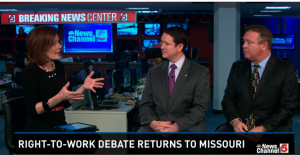House Speaker Jones inadvertently reveals law’s true intent: drag down all workers’ wages

– KSDK-TV screen capture
As the Missouri legislature began debating the anti-worker right-to-work (for less) in the first hearing of the new legislative session Jan. 13, yet another poll gives lie to the Republicans mantra that Missourians support such an anti-worker law.
In a discussion last week on KSDK-TV Channel 5, Missouri House of Representatives Speaker Tim Jones (R) alleged that Missourians, by a wide margin, want to see the law passed.
He was challenged on the air by Jeff Aboussie, executive secretary- treasurer of the St. Louis Building Trades Council. Off the air, Jones was also challenged by citizens living in Southwest Missouri in the Springfield area.
In a poll taken by the area’s leading newspaper, The Springfield News Leader, readers were asked:
“Should the Missouri General Assembly pass a Right to Work law?”
With 1,447 readers responding: NO – 88 percent; Yes – 10 percent.
NOT THE FIRST POLL
This is not the first time Missouri residents have been questioned on the issue. Since Speaker Jones made this his top priority, at least four independent polls taken by different news organizations show that Missourians overwhelmingly reject Jones’ premise that Missourians want this law; in every one of the polls, respondants clearly said “NO.”
• Dec. 2010 – St. Louis Business Journal: NO–77%; Yes-23%.
• Dec. 2012 – Southeast Missourian – NO – 61.4%; Yes-28.6%.
• Feb. 2013 – The Missouri Times – NO – 68%; Yes – 32%.
• Aug. 2013 – St. Louis Business Journal – NO – 82%; Yes – 18%.
• Jan. 2014 – Springfield News Leader – NO – 88%; Yes – 10%.
While these are not scientific polls, they are certainly a solid gague of public opinion as they span time and geographical differences.
RTW INTENT: DRAG DOWN WAGES
Jones unwittingly revealed the true intent of the law he and others are proposing at the behest of their major, out-of-state special interest groups: it will drive down the wages and benefits of all workers when he said:
“(The RTW law) requires unions to be competitive with non-union shops; it helps rise all workers.”
Translation: we need to drag workers’ (ALL workers) wages down in order to compete with RTW states like Mississippi and Georgia. He said nothing about corporations’ reducing their profit margins by lowering the cost of goods and services to consumers if they are paying their employees less money.
Then Jones tried to quickly cover his inadvertent error by saying that in RTW states, if you “factor in cost-of-living you actually see wages going up.”
Aboussie countered by pointing out the simple fact the net effect of a RTW law is to decrease household income – that’s real money families have to spend on food, housing, clothing, education, etc. – “by about $5,000 per household.” That is a fact backed up by the U.S. Census Bureau’s latest data. The specific number if $4,613 LESS earned in RTW states compared to worker friendly states like Missouri where there is no RTW law.
“This is a very dangerous piece of legislation for the middle class,” Aboussie rightly pointed out.
The bill’s language is similar to the “model” legislation on right-to-work (for less) designed by the American Legislative Exchange Council (ALEC), the anti-worker, pro-business group that has financed more than $40,000 in trips for Missouri legislators. ALEC is funded by radical right-wing pro-business groups.
MORE MISSTATEMENTS
Throughout the TV news segment, Jones continued to misrepresent the truth about the law. Some examples:
Jones: RTW gives workers the choice as to whether or not they should have to join a union.
FACT: Workers already have that choice protected by federal law. If there is a union at a plant that has been voted in by the majority of workers, a new employee has the right not to join.
Jones: RTW keeps a worker from having to pay union dues.
FACT: If they don’t join the union, they don’t have to pay union dues. However, they are required to pay a fee to support the union’s efforts that win them better wages and working conditions because federal law demands that the union represent everyone covered by the union contract, members and non-members alike.
That fee only covers the cost of collective bargaining services and is usually lower than dues. Without requiring that fee, a worker would get all the benefits of the union contract, including the use of all the union’s services like grievance handling and costly arbitration of grievances, without paying a penny – in the vernacular, that’s called a “freeloader.”
No other organization in the U.S. is required to provide services to non-members: your local gym, your community housing association, the Bar Association, the medical association, etc., If you want the benefits of a group, you help pay your fair share of that group’s cost’s of operation.

